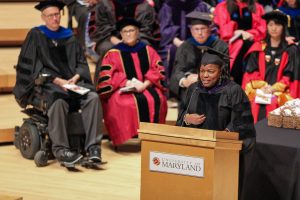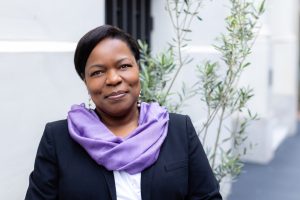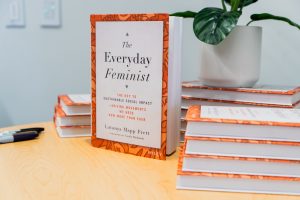The new CEO of Rockefeller Philanthropy Advisors on the importance of community, flexible-funding, and where philanthropy fell asleep.
In the heart of Ghent, Belgium, is a hotel that looks like a church. Among portraits of serene religious figures, pointed arch windows, overlooking a cloister and a neo-gothic chapel, delegates of the 2024 Philea Forum gathered for a networking breakfast hosted by Latanya Mapp, the new CEO of Rockefeller Philanthropy Advisors (RPA).
The Monasterium PoortAckere is a former 19th-century monastery-cum-hotel. Rooms once reserved for prayer and quiet reflection now host lobbies with coffee machines and urns designed to hold hot water rather than cherished remains.
It’s not an unfitting venue. Philanthropy’s religious origins are widely known: the oldest surviving charity in the UK, known today as King’s School Canterbury, was originally a monastery school founded by St Agustine in 597. While RPA is not affiliated with the Rockefeller Foundation directly (it is an independent philanthropic advisory group and network), it claims roots dating back to John D. Rockefeller, whose commitment to philanthropy was instilled by his Baptist mother, her lessons in ‘tithe’, and the importance of service to the community.
For Mapp, community is the concept that underpins not just her forthcoming work with RPA (Mapp became CEO in January 2024), but her entire career to date. Her book The Everyday Feminist, which seeks to celebrate and bring awareness to grassroots women-led activism, begins with the story of Innocent, the owner of a Nairobi hair braiding salon who might be the single biggest conduit of social change in her region: ‘Her offerings went beyond beauty styling… Innocent helped an entire community of refugees in Nairobi without any formal support.’ On one occasion, Mapp recounts, Innocent managed to source food, clothing, and shelter for a group of 200 refugees with only a day notice, ‘imagine what she could have done with support from international philanthropic or corporate aid’. As CEO of RPA, Mapp will spearhead an organisation fortified by its ‘vast community of committed donors’.
Under a vaulted ceiling, Mapp tells me that community has been on her mind a lot since coming to RPA. ‘Because of the way philanthropy has been so siloed, the funding gets siloed in ways that don’t allow [grassroot] communities to react and/or be proactive about issues they care about.’ She believes it’s one of the broadest challenges for philanthropy generally.
‘It’s not enough that we are writing cheques to people… trust means that you are in a relationship… that relationship goes both ways.’
It’s a challenge, we agree, that could be eased with a move towards more flexible funding. Flexible funding has been at the forefront of the philanthropy conversation for years now. Some grantmakers are slowly incorporating the concept into their funding models, but advocates are insisting that long-term, flexible funding is the only way to tackle the intertwined issues of the polycrisis, and traditional philanthropy is moving too slow. Part of the issue is trust, or lack of trust, between grantmakers and grantees.
‘Trust and philanthropy’ was the theme for the 2024 Philea Forum, European philanthropy’s flagship gathering. For Mapp, trust-based philanthropy equals flexible funding. She believes in trusting and enabling communities to spend their resources ‘and not have us create strategies that then silo the funding’ forcing them ‘to work on certain issues’. Trust-based philanthropy also means collaborative trust between philanthropic organisations, and, Mapp stresses, ‘communities trust in us.’ She hopes to inspire more trust-based philanthropy at RPA: ‘it’s not enough that we are writing cheques to people… trust means that you are in a relationship… that relationship goes both ways.’
What does that mean in practical terms? Mapp says it’s about brokering relationships. For clients working with RPA, ‘if there is a passion, a preference, a geography that you want to work with [RPA will] help you broker a relationship with someone that can bring that support to you.’ That, she says, ‘is what it means to be trusted. Thatʼs what it means to be able to leverage and be in community as a sector of philanthropy.’
What about the conversations about trust happening at Philea 2024? Mapp believes it’s good to have spaces to facilitate conversation and the sharing of ideas, particularly when the challenges of the global crises are so daunting.
Formally of the Global Fund for Women (GFW), Mapp possesses a truly global worldview, having lived in more than 15 counties and served in more than 52. In her last year at GFW, Mapp spearheaded the grantmaking process for around 450 organisations and groups across 101 countries. Prior to GFW, as the executive director of Planned Parenthood Global, she oversaw and supported partnerships with more than 70 organisations across Africa and Latin America.
It’s that international lens that Mapp allows to guide and drive her (in her opening address at the morning’s breakfast, she responded to a comment made by a colleague: ‘You’re European, and you say Europe is important. Well, I’m American and I say Europe is important’), but her inspiration will always be the individuals she calls ‘everyday feminists’. In 2022, at the time of its publication, The Everyday Feminist recorded only 1.6 percent of US charitable funding went to organisations dedicated to women and girls (Mapp notes that the percentage is cut by half for women and girls of colour in the US). Two years later, that 1.6 figure has risen only slightly to 1.9. Mapp believes the remedy might lie in pooled funding initiatives. Paraphrasing an African proverb she says: ‘If you want to go fast go alone, if you want to go steady then go together… we’ve got to do it together and go at a pace that will allow us to reach our goals.’

Latanya Mapp addresses policy graduates at a commencement ceremony, University of Maryland, USA.
Credit: UMD School of Public Policy.
RPA currently works with around 40 pooled funding initiatives. The first benefit of collective funds, according to Mapp, is their ability to quickly direct funding to what is required. The second is the way they shift the dynamics of power. When an advisory group gathers at the table, it includes everyone from donors to professional philanthropy experts to collaborators. The resulting conversations are ‘very much focused on the communities that need to be served and less about the various personalities of donors at the table’.
Mapp is most excited about the Women’s Political Leadership fund (one of RPA’s newest pooled funding initiatives), which aims to support women political leaders to be more effective while in office, supporting their agency and, where appropriate, their capacity for transnational collaboration. Given her passion for feminist-led movements and social issues, I’m interested in what she makes of the post-Roe vs Wade enmity sweeping the US and how philanthropy should respond. ‘There’s a chapter in my book,’ she says, ‘Stay in the game, even when you think you’ve won…where philanthropy fell asleep is thinking that we fixed it.’
In the two years since the US Supreme Court delivered the historic ruling that ended the nationwide right to abortion (known as the 1973 Roe vs Wade ruling) at least 14 US states have enacted near-total bans on abortion. Up to ten more have introduced tighter restrictions to limit access to abortion.
‘Where philanthropy fell asleep is thinking that we fixed it.’
The issue as Mapp sees it, is not fundamentally political. The transformative moment in US politics came when conservative and more radical fundamental forces discovered that the subject of abortion access could be used as a political wedge, and when used successfully to push a certain agenda, is used again and again. Even if the issue presents itself in the form of a bill being passed, Mapp believes in focusing efforts on larger systemic issues: ‘Understanding the system is as important as understanding the issue.’
‘The system’ goes beyond political opinions and agendas. Mapp cites a cultural system, which includes everyone from community leaders to religious leaders to schools. Gesticulating, she claims, ‘you can’t get at culture from up here. Culture happens here at a much more community level’ and ‘if they’re not singing from the same playbook… you really haven’t won yet.’ The two systems are inextricably entwined. They also, Mapp suggests, ultimately dictate the speed and trajectory at which philanthropy can move effectively.
‘If we can’t get to equality and equity in our societies then how do we ensure a future where… we have a climate that we care about and we respect and ensure?’
Large-scale, urgent global issues continue to dominate philanthropy conversations. War and conflict, and the climate crisis are just two examples. On the subject of war, Mapp is blunt. ‘It’s disgusting’ and ‘makes no sense’ for a civilised society she says. But to begin addressing the matter effectively, race and gender equity are issues ‘that we’ve got to get over’ because ‘those are things that are going to slow us down’. When it comes to the climate crisis, Mapp is prudent. ‘If we can’t get to equality and equity in our societies then how do we ensure a future where… we have a climate that we care about and we respect and ensure?’
In 2024, countries across the globe are engaged in the highest number of violent conflicts since the Second World War. The climate crisis has been described as the most imminent global threat of our time. In Mapp’s opinion, philanthropy needs to get its house in order. To tackle the planet’s largest, imminent threats we need to work from the ground up. Thinking judiciously about funding will ultimately lead to a society where philanthropy ‘is no longer necessary’ because in an equalised society, ‘resources automatically go to where they’re most needed’.
It’s an opinion that complements the ethos and position of RPA, as an organisation dedicated to improving the human condition globally. Mapp states, ‘reaching philanthropy at a much broader level was always why I took this job.
Words by Elaine Stabler, magazine editor at Alliance









Comments (1)
This person gets it! Wish I could meet her to talk about Native communities and more.